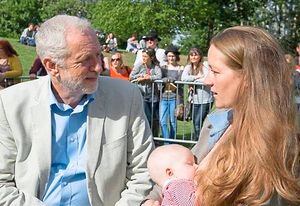Shrewsbury doctor welcomes calls over breastfeeding in public
Calls for the importance of breastfeeding to be taught in schools have been welcomed by a Shrewsbury doctor.

“Familiarity with breastfeeding” should be part of personal, health and social education in schools, the Royal College of Paediatrics and Child Health (RCPCH) said.
The announcement has been welcomed by Dr Laura Davies, who stood for the Labour Party in Shrewsbury at the last general election and was regularly seen breastfeeding her baby son Nicky while on the campaign trail.
“It says a lot about how society regards women,” said Dr Davies, who also challenged Daniel Kawczynski in the 2015 election battle. “Some people in this country are perfectly happy to look at women on Page Three yet have a real problem with women breastfeeding in public.
“It is something I feel really strongly about. I am very proud to be able to show that it can be done anywhere.”
Dr Davies was been photographed breastfeeding her son while chatting with Labour leader Jeremy Corbyn on a recent visit to Telford.
“Prominent political leaders have no problem with it, so why should anyone else?” she said. “I have met Jeremy Corbyn several times now and he is a very warm and friendly person. He is open minded and very modern and had no problem at all with me breastfeeding as and when I needed to.”
The RCPCH called on the Government to reinstate the UK-wide Infant Feeding Survey, which was cancelled in 2015.
Data from 2010 show that only 34 per cent of babies are receiving some breast milk at six months of age compared with 49 per cent in the US and 71 per cent in Norway.
Figures for England in 2015/16 show that while almost three-quarters of mothers started breastfeeding, this fell to 43.2 per cent when babies were between six and eight weeks old. The document suggests social stigma is at heart of the low breastfeeding rate.
Societal attitudes may lead to women feeling uncomfortable about breastfeeding in public or in the presence of peers and family members.
“There is very much a feeling that it is something that should be done in private,” said Dr Davies. “It is shocking that women still face negative comments and harassment while breastfeeding their babies in public places. When a baby needs feeding, they need feeding. The announcement by the RCPCH is very welcome. ”
Maternal concern about whether an infant is receiving sufficient milk may result in reinforcement from friends, family and health professionals, to “supplement” with formula which undermines maternal milk production, the RCPCH said.
The College advises that mothers should be encouraged and supported to breastfeed exclusively for up to six months and solid food should be introduced from six months, ideally alongside breastfeeding, to ensure the infant has adequate nutrition.
RCPCH president, Professor Neena Modi, said: “The UK has little to celebrate. The health benefits of breastfeeding are beyond question, from reduced likelihood of intestinal, respiratory and ear infections to hospitalisation.
“Regrettably the attitudes of a large part of society mean breastfeeding is not always encouraged. Breastfeeding in public is still often stigmatised. It is no wonder that for many mothers, there are too many barriers.”





